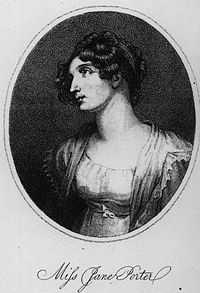Jane Porter
| Jane Porter | |
|---|---|
 Jane Porter, from The Ladies' Monthly Museum | |
| Born |
Jane Porter January 17, 1776 Bailey in the city of Durham |
| Died | May 24, 1850 (aged 74) |
| Occupation | Novelist |
| Nationality | Scottish |
| Citizenship | Kingdom of Great Britain |
| Period | 1803-1840 |
| Genres | Historical Fiction |
| Subjects | Historical Documentary |
| Notable work(s) | The Scottish Chiefs |
Jane Porter (17 January 1776 – 24 May 1850) was a Scottish historical novelist and dramatist.[1]
Life and work
Jane Porter was an avid reader. Said to rise at four in the morning in order to read and write, she read the whole of Edmund Spenser's The Faerie Queene while still a child. Tall and beautiful as she grew up, her grave and preoccupied air earned her the nickname La Penserosa (lit. "the pensive girl"), possibly a reference recalling the poem "Il Penseroso" by John Milton.
After her father's death, her family moved to Edinburgh, where Walter Scott was a regular visitor. Some time afterward the family moved to London, where the sisters became acquainted with a number of literary women: Elizabeth Inchbald, Anna Laetitia Barbauld, Hannah More, Elizabeth Hamilton, Elizabeth Benger and Mrs Champion de Crespigny.
Her 1803 novel Thaddeus of Warsaw is one of the earliest examples of the historical novel and went through at least 84 editions,[2] including translation into French and German.[3] Based on eyewitness accounts from Polish refugees fleeing the failed revolts against the foreign occupation of Poland in the 1790s, the work was praised by Tadeusz Kościuszko, the "Thaddeus" of the title and a hero of the American Revolution.
The Scottish Chiefs (1810), a novel about William Wallace, was also a success (the French version was banned by Napoleon), and it has remained popular with Scottish children. The Pastor's Fireside (1815) was a story about the later Stuarts.[4]
Porter contributed to various perodicals and wrote the play Switzerland (1819), which seems to have been deliberately sabotaged by its lead Edmund Kean and closed after its first performance.[5] She is sometimes "credited" with the 1822 production Owen, Prince of Powys, which closed after only three performances,[4] but this was actually the work of Samson Penley.[5] Porter also wrote Tales Round a Winter Hearth (1821), Coming Out (1828), and The Field of Forty Footsteps (1828) with her sister, Anna Maria Porter.[1]
A romance, Sir Edward Seaward's Diary (1831), purporting to be a record of actual circumstances, and edited by Jane, was written by her brother, Dr. William Ogilvie Porter, as letters in the University of Durham Porter archives show.
Jane and Anna Maria Porter, who both lived in London and Surrey later on, were sisters of Sir Robert Ker Porter, the historical painter.
References
- ↑ 1.0 1.1 Iain McCalman Ed. (2009) "Porter, Jane", An Oxford Companion to the Romantic Age, Oxford University Press
- ↑ Looser, Devoney. Women Writers and Old Age in Great Britain, 1750–1850, pp. 157 ff. JHU Press, 2010. ISBN 978-1-4214-0022-8. Accessed 30 September 2013.
- ↑ Laskowski, Maciej. "Jane Porter's Thaddeus of Warsaw as evidence of Polish–British relationships". Instytucie Filologii Angielskiej (Poznan), 2012. Accessed 26 September 2013.
- ↑ 4.0 4.1 The Oxford Companion to English Literature. Birch, Dinah (ed.) Oxford Univ. Press, 2011.
- ↑ 5.0 5.1 McMillan, Dorothy. Oxford Dictionary of National Biography, "Porter, Jane." Oxford Univ. Press (Oxford), 2004.
- Lee, Elizabeth (1896). "Porter, Jane". In Lee, Sidney. Dictionary of National Biography 46. London: Smith, Elder & Co. pp. 182–184.
- Todd, Janet (ed.) "Porter, Jane." in British Women Writers: a critical reference guide. London: Routledge, 1989. 542-543.
External links
| Library resources about Jane Porter |
| By Jane Porter |
|---|
- The Scottish Chiefs audiobook at the Internet Archives (Note:In this reading, some of the pronunciations of Scottish place-names are non-standard.)
- Works by Jane Porter at Project Gutenberg
- Archival material relating to Jane Porter listed at the UK National Archives
- Porter Family Collection at the Kenneth Spencer Research Library at the University of Kansas
Jane Porter biographies
|